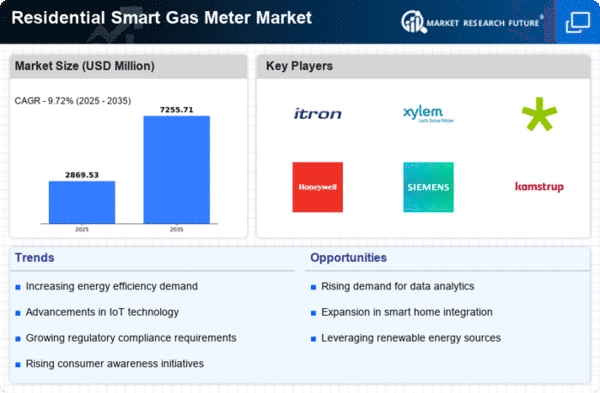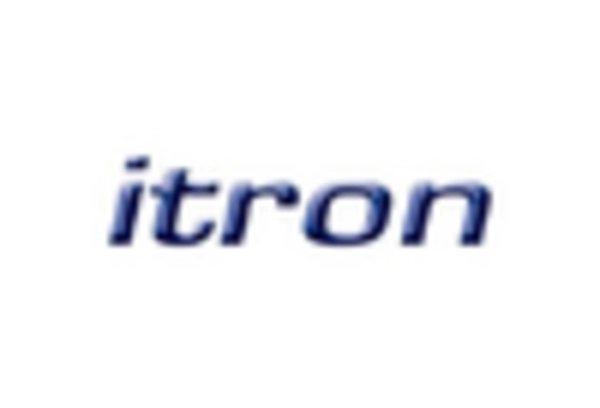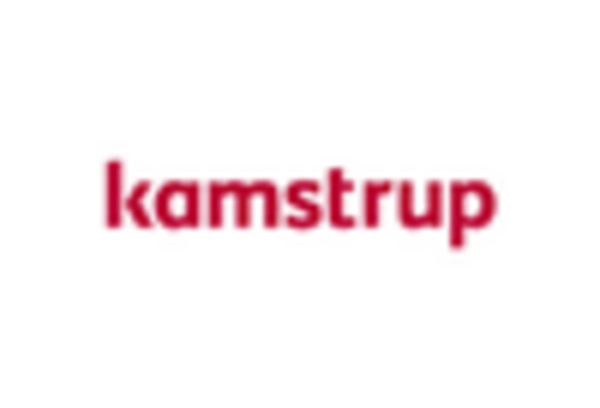North America : Market Leader in Smart Meters
North America is poised to maintain its leadership in the Residential Smart Gas Meter Market, holding a significant market share of 1300.0. The growth is driven by increasing demand for energy efficiency, smart grid technologies, and regulatory support for advanced metering infrastructure. Government initiatives aimed at reducing carbon emissions and enhancing energy management are further propelling market expansion.
The competitive landscape is characterized by key players such as Itron, Sensus, and Honeywell, who are innovating to meet consumer demands. The U.S. leads the market, supported by favorable regulations and investments in smart technologies. The presence of established companies ensures a robust supply chain and technological advancements, solidifying North America's position as a market leader.
Europe : Emerging Market with Growth Potential
Europe is witnessing a significant transformation in the Residential Smart Gas Meter Market, with a market size of 800.0. The region's growth is fueled by stringent regulations aimed at energy efficiency and sustainability, alongside increasing consumer awareness of smart technologies. The European Union's commitment to reducing greenhouse gas emissions is a key driver, encouraging the adoption of smart metering solutions across member states.
Leading countries such as Germany, France, and the UK are at the forefront of this transition, with major players like Landis+Gyr and Elster actively participating in the market. The competitive landscape is evolving, with a focus on innovation and integration of IoT technologies. As regulatory frameworks continue to support smart meter deployment, Europe is set to enhance its market share significantly.
Asia-Pacific : Rapid Growth in Smart Metering
Asia-Pacific is emerging as a significant player in the Residential Smart Gas Meter Market, with a market size of 400.0. The region's growth is driven by urbanization, increasing energy consumption, and government initiatives promoting smart grid technologies. Countries like China and India are investing heavily in smart metering solutions to enhance energy management and reduce wastage, aligning with their sustainability goals.
The competitive landscape features key players such as Kamstrup and Siemens, who are expanding their presence in the region. The demand for smart gas meters is expected to rise as governments implement policies to modernize energy infrastructure. With a focus on technological advancements and regulatory support, Asia-Pacific is poised for substantial growth in the coming years.
Middle East and Africa : Untapped Market Opportunities
The Middle East and Africa region presents untapped opportunities in the Residential Smart Gas Meter Market, with a market size of 115.32. The growth is driven by increasing urbanization, energy demand, and government initiatives aimed at improving energy efficiency. Countries in this region are beginning to recognize the importance of smart metering technologies to optimize energy consumption and reduce costs.
Leading countries such as South Africa and the UAE are making strides in adopting smart gas meters, supported by investments from key players like Diehl Metering. The competitive landscape is gradually evolving, with a focus on enhancing infrastructure and regulatory frameworks. As awareness of smart technologies grows, the region is expected to see significant advancements in smart gas metering solutions.
















